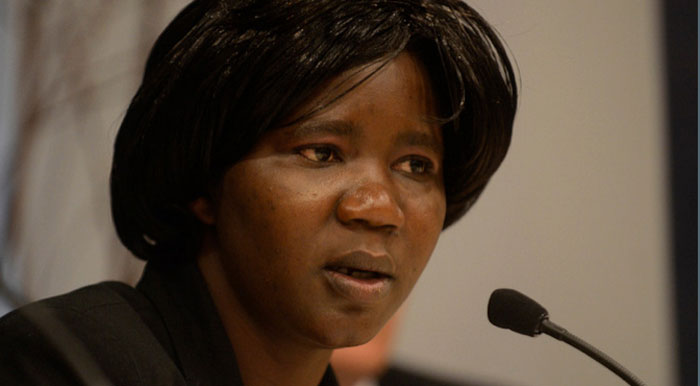
“The atrocities that children were forced to go to villages, to abduct more children, is none other than evil – pure evil that the LRA was doing in northern Uganda,” Grace Akallo, a former captive of the Lord’s Resistance Army (LRA), told an IPI audience on June 5, 2012.
Author of the book Girl Soldier: A Story of Hope for Northern Uganda’s Children, Ms. Akallo was speaking at a policy forum co-organized with the Permanent Mission of Germany to the UN, on the impact of the LRA on children and how the group is being confronted by the international community.
Ms. Akallo was abducted from her school by the LRA in October 1996 in northern Uganda before escaping. She is now the Founder and Executive Director of United Africans for Women and Children Rights (UAWCR).
“When I was abducted, this was a question in my mind, ‘Where is everybody to protect me? Where is everybody to protect all these children?’” she said. “The LRA subjects you to beating, brainwashing, and the brainwashing is not just telling you things, but threats of death.”
Speaking about the crackdown in recent years on LRA atrocities, she said, “It is great that today that is changing, a difference is being made. The US soldiers, 100 soldiers, have been sent into Uganda. The AU is increasingly involved. The UN is involved. I wish that was before, but better late than never.”
She cautioned however, that the issue is about more than simply finding and punishing Joseph Kony, leader of the LRA. “I think what happens next is very important,” she said. “The abduction of thousands of children in northern Uganda has left a great hole that will be felt for generations. Joseph Kony going to Congo, Central African Republic, Sudan, is going to leave a great deep hole that can never be repaired if we just capture Kony, put him in a jail, and say ‘Ok, all is done’. A great damage has been done.”
She asked, “What is the new generation going to look like? Who is going to be blamed if anything else happens?” She warned that if these issues were neglected, “they could go back and start a new LRA, which might be even worse.”
The other speakers on the panel were Radhika Coomaraswamy, Special Representative of the Secretary-General for Children and Armed Conflict; Michael Poffenberger from Resolve, an official Kony 2012 Campaign partner; and Adonia Ayebare, Deputy Permanent Representative of Uganda to the UN.
Ms. Coomaraswamy spoke about a newly released UN report on children affected by the LRA.
“It appears the LRA has started to abduct children for a short period, using them primarily as porters or accomplices in the looting and pillage of food and medicine. They are then released,” she said. “This is so that they would not be a burden on the group, and this suggests that the group may be in survival mode.”
“Almost all girls mentioned in the report were subjected to repeated sexual violence, and forcibly marrying combatants,” she said.
“There is no doubt that the LRA has been weakened, it is scattered, but it continues to have the capacity to make random attacks. It casts a long shadow in CAR, DRC, and South Sudan.”
The LRA has attracted a lot of popular attention recently due to the Kony2012 short films and subsequent campaign, initiated by Invisible Children in March 2012. The two videos have so far been viewed over 90 million times on YouTube. The campaign has also been controversial however, as it is perceived to advocate a military solution to capturing Joseph Kony. On this discussion, Ms. Coomaraswamy said that, “All military efforts…must place protection of civilians front and center.”
Michael Poffenberger agreed, saying that “things have been moving in the right direction on the international stage,” and spoke of three key challenges that remain in making the international and regional effort to tackle the LRA succeed.
First, politically, he said that “cooperation amongst governments in the region to address the LRA is not something that is at the top of their agendas.” Secondly, there is a need to improve resources for infrastructure. “Basic infrastructure is a key tool to squeeze out the LRA’s ability to operate,” he said, noting that attacks have diminished where infrastructure is relatively better. Third, in terms of any military efforts, the lead will be taken by regional governments but that they need more commitment to the issue, as well as intelligence support and mobility lifts to support active military pursuit.
Ambassador Ayebare said that for the Ugandan government, “we always insist that the political solution, that door is still open, for the LRA to come and implement the [Juba peace] agreement.”
He was very supportive of the AU-led regional initiative. “I think that has been a paradigm shift. In the past it was the Ugandan government fighting the LRA alone. Now, a decision was taken at the regional level to involve the AU. That is significant.”
“An AU-led regional initiative will be more sustainable…We should resist the danger of trying to dilute that, and internationalizing it,” he said.
Pernille Ironside, Child Protection specialist at UNICEF also provided an update on reintegration efforts of children abducted by the LRA.
Peter Wittig, Permanent Representative of Germany to the United Nations, provided opening remarks, saying that the “LRA has now become synonymous with brutal abduction and use of children as child soldiers, porters, spies, or sex slaves.” He stressed that “we should build upon the UN regional strategy” to support the AU regional initiatives,” and most importantly, “combat immunity.”
The event was moderated by Warren Hoge, IPI Senior Adviser for External Relations.
Watch event:







